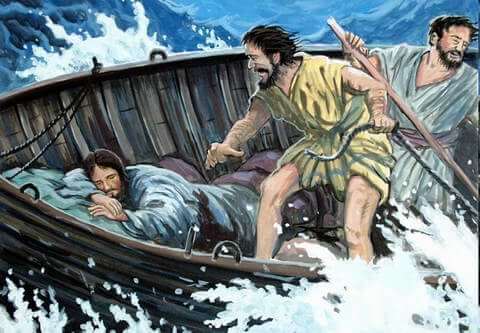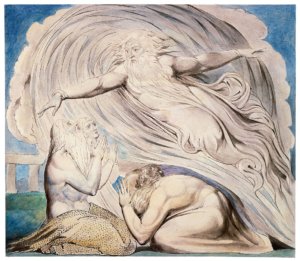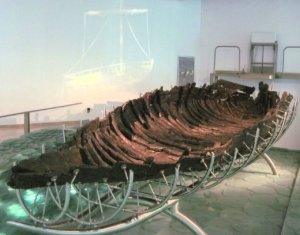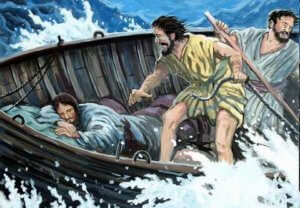
Finding Our Way With Prayer
 Our readings from the Book of Job and Mark’s gospel this morning both take us into the middle of a storm. God speaks to Job out of a whirlwind. Weather and natural occurrences can cause whirlwinds — like the chaos of the storms forming even now in the Gulf of Mexico. Powerful winds and floods can destroy homes, electric lines and water sources, making us feel lost and fearful.
Our readings from the Book of Job and Mark’s gospel this morning both take us into the middle of a storm. God speaks to Job out of a whirlwind. Weather and natural occurrences can cause whirlwinds — like the chaos of the storms forming even now in the Gulf of Mexico. Powerful winds and floods can destroy homes, electric lines and water sources, making us feel lost and fearful.
Whirlwinds can also come in human conflict, whether on a personal or global scale. We can feel lost and fearful in our own families and communities when death, addiction, divorce, or illness emotional, psychological, or physical — undermine our sense of security. We can lose our way as a human family, when we get used to — and stop noticing and trying to fix — our own self-focus, apathy, and carelessness about systems of oppression, whether against people, nations, or the earth itself.
Any kind of change can feel like an overwhelming whirlwind in our lives, causing us to feel lost, fearful, and separated from our own identity, even when things are changing for the good. For example, as we emerge from pandemic restrictions to return to worship “as normal,” even that positive whirlwind of activity and can be disorienting. So many details! Did we get enough hymnals and prayer books back in the pews? As we put the prayer books and hymnals back in the pews, did we get the page numbers right in the bulletin and on the hymn boards? Do we have enough people for the procession of the gifts? And this one has my attention — after more than a year of not singing, do I even remember how to chant?
We’ve Lost Our Way
In these moments of disorientation, we’ve forgotten who and where we are, and how we want to be in the world. We’ve lost our way. Especially when our life — or way of life — is threatened, we can wonder where God is.
So how do we find our way when we’re lost and off track? First, we remember is that God is not the storm. And second, we reconnect with God in prayer.

CC BY-SA 4.0
God speaks to Job out of the whirlwind, not as the whirlwind, reminding Job of God’s role in creation — which, by the way, was not one bit dependent on Job’s control of the process. And Jesus is not the storm on the Sea of Galilee in Mark’s gospel. During my time in the Holy Lands, we went out on the Sea of Galilee with every pilgrimage in motorized wooden fishing boats, with deep wood-ribbed keels. The boats are called Jesus Boats today, because they’re modeled after fishing boats from Jesus’ time.
The pilgrims sat on benches around the big deck in the sun while we read from Mark’s gospel about Jesus quieting the storm. And even though the Sea of Galilee is actually a freshwater lake, about 60 miles around, storms can come up quickly.
I’ve been out on the boat a number of times when the sky darkened, the winds came up, and the waves rocked the boat. We’d signal the captain to turn off the motor so we could experience the surprising force of the wind and the storm on the small lake, where you can always see both shores. Out on the Sea, especially after a long day of pilgrimage, it was easy to see how Jesus, tired from all the teaching and preaching, could fall asleep on a cushion in the stern of the boat.
 And that’s an important detail in Mark’s gospel. As the windstorm comes up, and the waves beat into the boat, swamping it, Jesus is having a nice nap in the stern. Jesus does not summon the storm, or even react. It’s the disciples who panic, sure that Jesus has abandoned them. They wake him up, saying, Teacher, do you not care that we are perishing? Jesus — who’s been in the stern of the boat right by the tiller the whole time — calms the storm and all is smooth sailing.
And that’s an important detail in Mark’s gospel. As the windstorm comes up, and the waves beat into the boat, swamping it, Jesus is having a nice nap in the stern. Jesus does not summon the storm, or even react. It’s the disciples who panic, sure that Jesus has abandoned them. They wake him up, saying, Teacher, do you not care that we are perishing? Jesus — who’s been in the stern of the boat right by the tiller the whole time — calms the storm and all is smooth sailing.
Focusing on the Area of Pain
Why do we feel God has abandoned us when we are in fear or in pain? As Jesuit priest James Martin says, maybe it’s because when we’re struggling we tend to focus on the area of pain. It’s natural, but it makes it more difficult to see where God might be at work in other places.
Homiletics professor Jan Schnell Rippentropp tells us that we need to have habits and practices that bring us into predictable awareness of the divine. We need to have tools that pull us out of the storm of information, disaster, and grief that is NOT God so that we can breathe in the Spirit. When we are caught up in turmoil, saddened by more loss than we think we can bear, face conflict in our families or communities, or are just headed in the wrong direction, the tool to grab is prayer. Prayer connects us with God, reminds us what we believe, and who we want to be with others. Prayer doesn’t change God. Prayer changes us. As Archbishop of Canterbury Justin Welby says, Prayer is not about sending requests into the sky. It’s about allowing God to make us more like Jesus Christ.
And prayer is not only about words. As Pope Francis tells us, You pray for the hungry. Then you feed them. This is how prayer works. How do we learn to pray? We learn — as Archbishop Justin tells us — By praying. We repeat and repeat our prayers, reminding ourselves of the way of Jesus we have chosen, and the path before us becomes clear. Amen.
